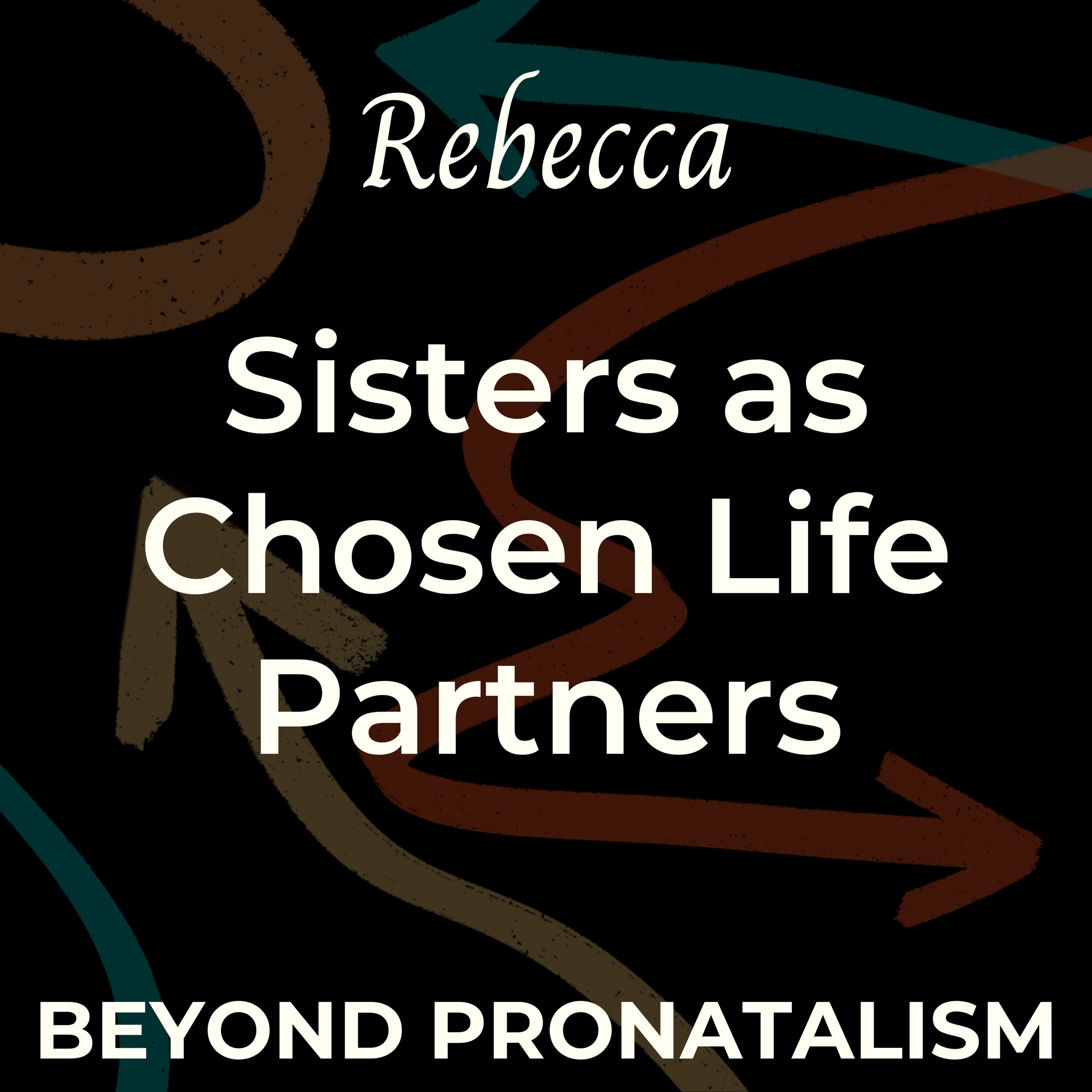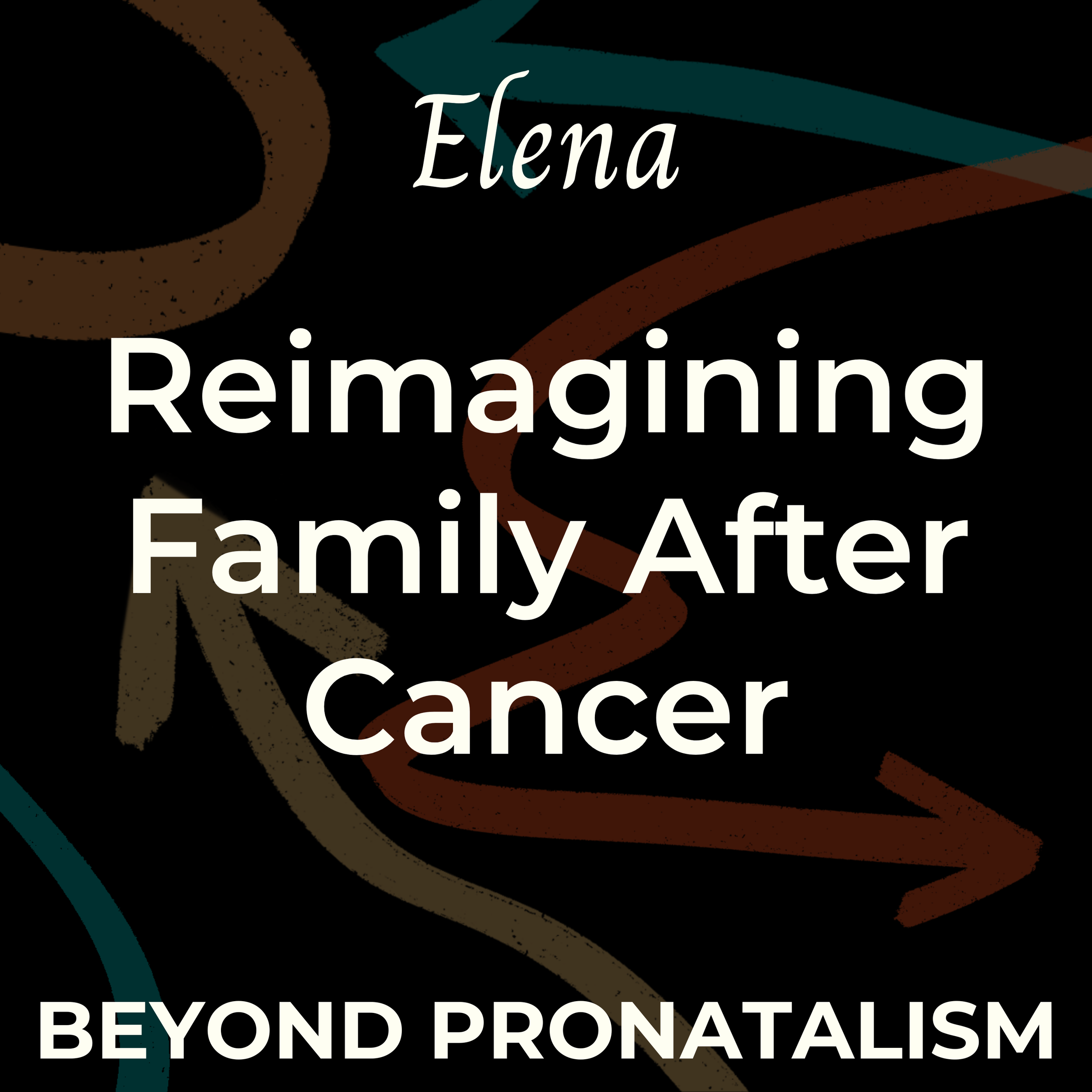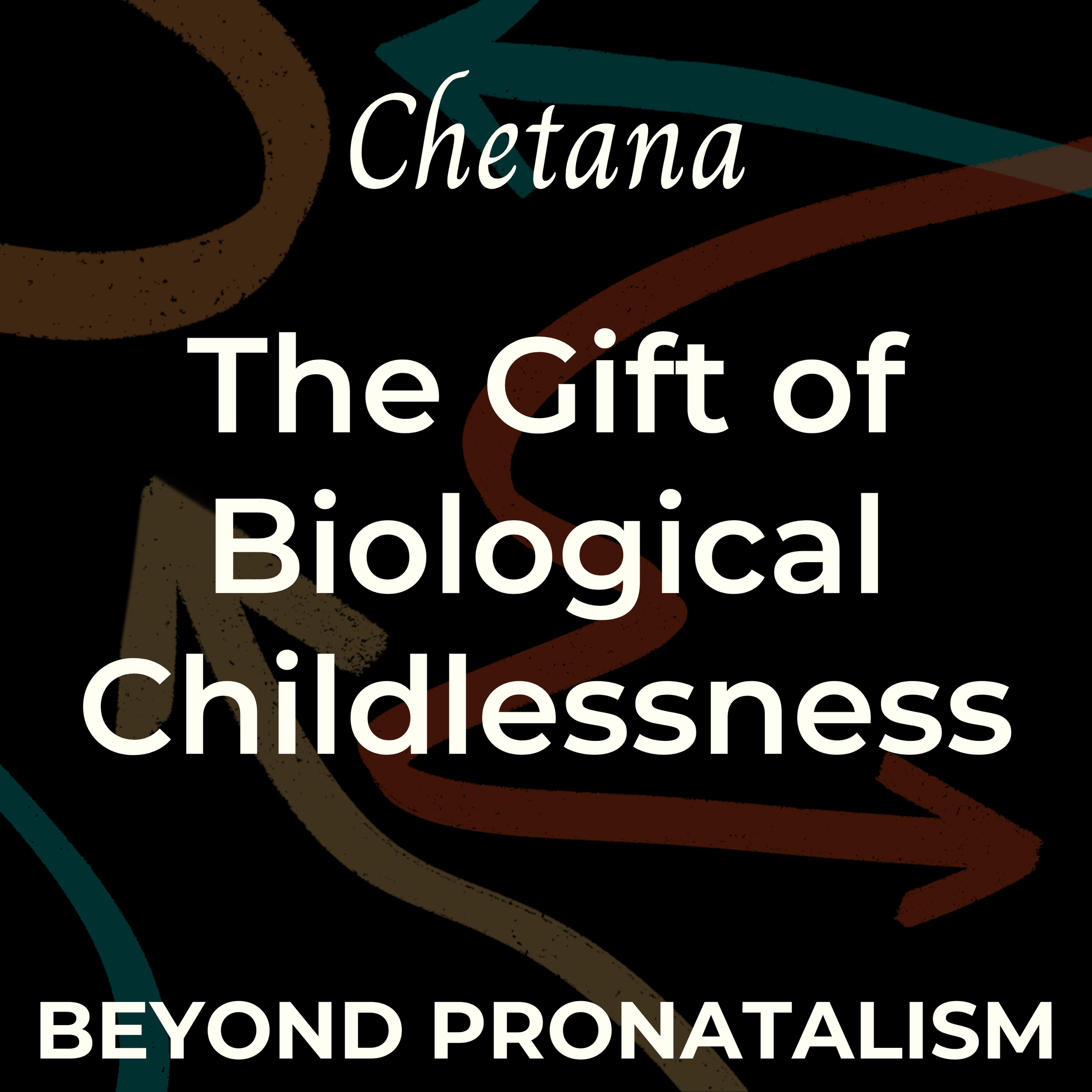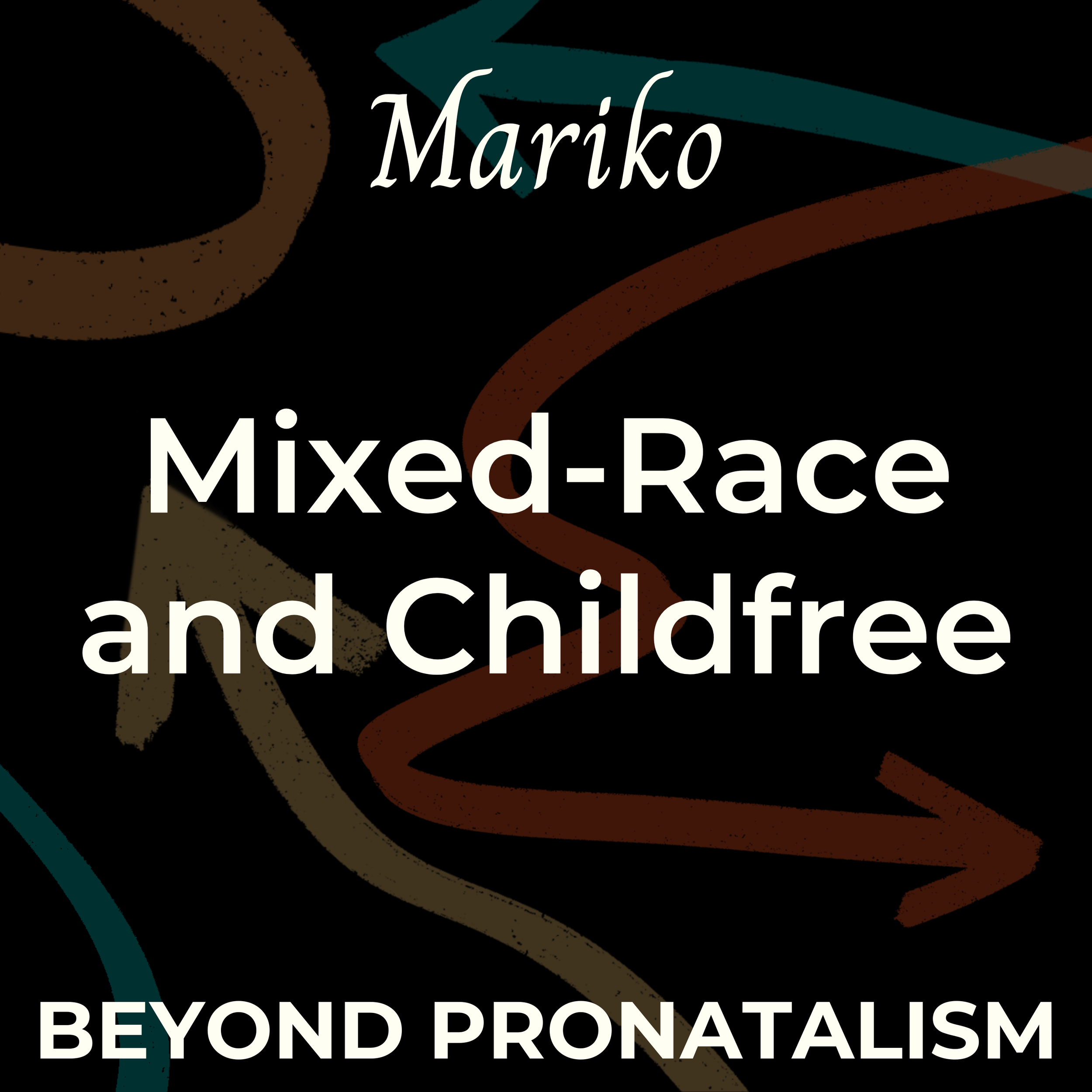Juliana | Childfree for Earth and Animals
Raised within the religiously-conservative Colombian culture with a lonely and isolated childhood, Juliana describes her journey of finding liberation by rejecting harmful societal norms and choosing a radical pathway of becoming a childfree environmentalist and animal rights activist.
-
Juliana 0:00
I was 28 years old, old enough to know that I didn't want children. I went to our local parenthood institution, it's called Pro Familia that provides reproductive services. And I said, Well, I want to get my tubes tied. And I had an appointment with a psychologist, and I did it. And it was easy. It was pain free. It was a great decision in my life, because I wanted to have a certainty that I wasn't going to be a mother. My grandma was the one that raised me. And I remember when she found out, she told me that I was really brave. She said, I really admire you because you decide what you want to do with your life, that she wished she had the opportunity to decide for herself, and she didn't. She was living in a world that forced her to have children.
Nandita Bajaj 1:06
That was today's guest, Juliana. Hello everyone and thank you for joining me on this journey. My name is Nandita Bajaj and I'm the host of Beyond Pronatalism: Finding Fulfillment, With or Without Kids, an interview series in which, through intimate conversations with women and men from diverse backgrounds, I explore how they are courageously and creatively navigating pronatalism - the often unspoken pressures to have children, whether from family, friends, or the culture at large. In each episode, I dive into personal stories with people who are forging unconventional pathways to fulfillment, including redefining what family means to them - whether that means being childfree or childless, having biological kids, adopting or fostering children or animals, or creating close-knit communities of friends and loved ones. Hi, Juliana. Welcome to our podcast. It is so nice to have you here today.
Juliana 2:05
Hi, Nandita and thank you for inviting me and hello to all the listeners.
Nandita Bajaj 2:09
Amazing. So Juliana, why don't you give us a brief overview of what the culture is like within Colombia when it comes to pronatalism? How much freedom do people really have of deciding for themselves if they want or do not want children?
Juliana 2:27
Well, I think right now is very different from like 20 or 25 years ago when I was going to school. I went to a private Catholic school, and it was run by nuns. And they told us that we, after we finished high school, we needed to get married and have children. And church, at least Catholic Church, is very powerful here. And they have influence in every other aspect in the lives of Colombians. 30 or 40 years ago, women were forbidden to plan their families. They had to have children in order to be a good wife. Husbands expected women to have children. For example, my grandmother and the women in that era had 13,14, even 20 Children. It was really normal. And then, as the rest of the world, birthrates started to go down, and right now women are having probably three or two children. But what I see now is that we are not like in some other countries where religion is really strong and you can get punished by not doing what the religion says. We can do whatever we want here. We are free, not completely, but we are free. And I see that, for example, all of my friends have decided not to have children, not because I told them to, but because they see difficulty in having children in this country right now. Because, as you may know, Colombia is a developing country. We have a lot of violence issues, economic issues, inequality. So women right now are questioning their roles. And they are saying that they can't afford to have a child right now. It's very difficult for us. To raise another person is not easy. Our minimum wage is about $300 a month. It is about 1,200,000 Colombian pesos. And that's not enough to raise a child, to send to schools, buy clothes, all of the things that come with having children. It's very expensive, and we don't earn that much money. So yeah, I think that's the main thing. And there's also one thing about our culture that are telenovelas. Telenovelas, or soap operas, are very influencing in the way that people behave in Colombia. We have telenovelas since 10am until 10pm, non-stop. We have telenovelas from Mexico, from Turkey, and from Colombia. And telenovelas always send the message that women have to have children to get their happy endings. Fortunately, we are more educated now, women in our country and we're trying to move away from that. But there's still people that the only thing that they can do in a day is watch television. So I think that's a problem, because telenovelas are sending the wrong messages. And another thing I wanted to say is that in Colombia people always think about one female and one male and sometimes I see when they don't have the male and the female, they keep trying until they get the sex of the child that they want. And I find that very selfish, because it's like they’re gambling until they win the lottery. And that's very, not fair for the children they have, or they will have.
Nandita Bajaj 6:23
Absolutely, yes, I see that in so many different communities and cultures. I saw so many of my own parents’ friends and family friends who were - they kept having kids until they got the right sex. In India, it was mainly the pressure to have at least one boy. So yeah, some of my relatives have like three or four daughters, and then a boy. So I think that's very common. And you're totally right. It's such a disservice to the children, so unfair for them. Thank you so much for providing that nice summary of the situation in Colombia. And what was your personal experience like navigating pronatalism?
Juliana 7:06
Well, I think it showed like it does for every woman on Earth. And it was through telling me that I wasn't going to be a complete woman, unless I have children, unless I became a mother. And when I was growing up, I don't remember much about my parents telling me that because, in fact, I have like, I don't want to say bad childhood, but it was not the kind of experience that you want to grow up. You want to be taken care of, you want to feel like you're not alone in the world. And I had to, in fact, like grow up by myself. And then I felt really lonely and isolated and didn't have my parents' attention. So for me it was like realizing that everything I was told about motherhood wasn't true. Not all people need or can or should become mothers, because that's the greatest responsibility a human being can have. I don't think it's something you take lightly, like I'm going to buy a chair. I'm going to have another human being. And the experience with my mom and with my parents - I'm feeling so lonely and so isolated and made me think that I didn't want to be that for another person. I didn't want to be the absent parent.
And then, when I was a little older, and I started to see what's happening in our planet, what's happening around us with the environment, with the social justice, with animals, I finally took this decision that I didn't want to have children. And I went to our local parenthood institution. It's called Pro Familia that provides reproductive services. It's an NGO, but it works closely with the government. They're doing an amazing job. They are supporting women's rights, the right of choosing if they do want to have children or not. There's another thing that happens here a lot. And there are these men that get their woman pregnant, and then they leave. And the women have to raise the child alone. Women are the ones that are getting their surgeries done and for men it's more complicated not because of Pro Familia, but because of the mindset. They say that they are going to lose their libido, that they're going to be less of a man, and they are not going to have a good sex life. And so they are not willing to do the procedure. And those things women want to avoid. So they are protecting themselves, and they are planning their motherhood. So I went there. I was 28 years old. I was old enough to know that I didn't want children. And I said, Well, I want to get my tubes tied. And I thought they were going to be really complicated, because I heard stories about other people going there. And they were told that they were not going to do the procedure because they were not married, because they didn't have children in that you have to have at least two children to get the procedure. So I was really scared to be rejected for the procedure. But when I went there, the only question they told me, Are you completely sure because this cannot go back. And I had an appointment, like 10 minute appointment, with a psychologist and she says, Are you sure you have a choice? And I said, Yes, I'm completely sure. And I did it, and it was easy. It was pain free. It was a great decision in my life, because I didn't want to be subjected to a man's wish. I didn't want to fall in love in the future and then change my mind because of a man. I wanted to have a certainty that I wasn't going to be a mother because I didn't want to bring another child to the world. Our society's collapsing, so I didn't want to do that to my children. And I once saw a quote that said, I love my children so much that I don't want them to be in this world. When I got the procedure, I didn't tell my mom. I didn't tell anyone. And when my mom found out because I told her, like, a couple of years later, the first question she asked me was this question that all of us get, Who's going to take care of you when you grow older? And I said, Well, I don't care, because on the one hand, you didn't take care of me when I was growing up, and if you have me because I was going to take care of you, that is a selfish reason. I'm not here in this world because you needed some elder care. And yeah, the questions I think we all get when we say we are not going to have children are, Who's going to take care of you when you are older? You're selfish. Your life is not, doesn't have a meaning. What happens if you find the right man? Like, I believe those are not the reasons why you should have a child. If you really want to have a child, you should do it thinking of the child - you need to know that this child will have the environmental, social, financial resources to have a good life and no one, no one can guarantee that to a child now. No one. It's not possible in the world that we're living in.
Nandita Bajaj 12:47
Thank you so much for sharing your personal history. And just like your experience, I think so many people are met with those types of questions from such a young age. And so many people, especially girls and women, just assume that motherhood is part of their journey. And there is so much misinformation about what it means for men to get a vasectomy, to not have children, or not have many children. It really does show up as an attack on their manhood or manliness. That is an extension of pronatalism. And I love that you knew by the time you were 28 which, by the way, was also the same time when I realized that I could even choose to not have a child, but that you took matters in your own hand, decided that you wanted a certainty that this was not going to happen. And when it came to that decision about getting a tubal ligation did you ever find like leading up to that decision, or after that decision, that there were other types of pressures from family or from community members that you had to navigate?
Juliana 14:05
I'm going to be honest. My grandma was the one that raised me. She was like my mom in that figure. She was the person that was with me all the time. And I remember when she found out, she once told me - that makes me cry a little bit because I miss her so much; she died - she said that I was really brave, that she wished she had another option. She wished she had the opportunity to decide for herself and she didn't. She was living in a world that forced her to have - she had three children - that forced her to have children and she said I really admire you because you decide what you want to do with your life. She congratulated me because by the time I said, I want to be single forever, I don't want children and she said, Well, that's a good choice. This Colombian culture is really what we call machista, And we women are seen only like a vase to procreate, have children. And another thing that was important to me, Nandita, is that I chose a life of being an activist. I'm an activist for the environment, for the animals. And that is like, the responsibility that I have now, I'm an activist in the first minute of the day until I go to bed, because that's the commitment I made with my life. This is what I want to do. And sometimes I, I wonder, if I had kids right now, could I be doing this? Do I have the time? The answer is always no. And I don't want to sacrifice the things I'm doing. I'm not saying I'm changing the world. But, at least I'm trying. This is the life that I want to have. I don't want to live another life. But people say that I'm very passionate, very radical with my ideas with my choices. And I think nobody dares to question me anymore.
Nandita Bajaj 16:06
Why do they think you are radical? Because you didn't have children?
Juliana 16:09
Because I don't have children, because I'm a vegan, because I don't use a car, because I try to never fly, because I am a zero waste person. I do things that people see like I'm sacrificing things in order to be this person that I want to be or this person that I created. Because nobody in my family is like me. I mean, I didn't have an example. I started this by my own. People say, where do you get all this? Why are you like that? And I'm like that because I have the ability to open my eyes and see the reality of the world we're living in. And I think all of us have the opportunity to be another person, impacting the planet less. My decisions are supported by data. I have the information and I do what I want to see in the world. I am the person that I want to be in a world that is collapsing and that we share with other animals, because sometimes we forget that we're not the only ones here.
Nandita Bajaj 17:13
Absolutely. Well, first of all, there's two radicals. There's you and there's me, because we share a very similar lifestyle. Isn't it interesting that for people, especially for women, when they express ideas that don't fit the social norms, that show that they know what they want, and they are following that path of passion and commitment that they are called radical.
Juliana 17:39
Is very interesting and very sad at the same time, because when I was taking my master's degree, I always am very vocal. I remember that every time I questioned something, my classmates called me, You're hysterical. Calm down. And I said, what would happen if I was a man? Would you say the same thing? And of course not. Because when a man questions, he's very brave. Wow, he knows about things. He's very informed. And he's not afraid to speak. But when a woman does, then we're radical, hysterical, like, being radical was a bad thing. It's not. When we speak about radical, we're saying that we are going to the roots of the problem. So yeah, I love being told that I'm radical. I love it. Like, yes, I am. And I'm not ashamed to be. But it's also sad, because it comes with a background of misogyny.
Nandita Bajaj 18:46
Yes, yes, exactly. And I love that you embrace that, as do I, because like you said, being radical is about questioning the very foundation of all of these different forms of oppressions. And if you start questioning them, then as you said, as has been your experience and mine, you get called radical or hysterical to suppress your views. This is one of the big reasons that I'm doing this podcast is to actually elevate the voices of people like you, whose voices in culture are suppressed, because people don't like to hear the kinds of things that you're offering. And that's why I appreciate you so much. And I would love to hear a little bit more about the kind of work you're doing. And where are you at with things right now? How are you spending your time? How do you navigate your life?
Juliana 19:48
I myself don't want to have children like you Nandita. And I am going to say this now, You are such an inspiration. Like you Nandita, in a different way, I try now to spread the word. And right now, I'm the director of an organization that works for animal rights. I've been the director for, next week, will be 21 years.
Nandita Bajaj 20:11
Wow, congratulations.
Juliana 20:13
Thank you. We can drink now. And I'm also a teacher at two of the local universities. In one of them I am the coordinator of a animal law program. And in the other one, I give a class that is called Environmental Fundamentals. And we go through the main problems our world is facing. I try to be like an example for my students. And they see that it's possible to be cool, because I'm a funny teacher and I'm also committed to do things right.
Nandita Bajaj 20:51
I would love to be in your class, Juliana. I do think you're very cool. I love talking to you.
Juliana 20:57
Like I'm a stand up comedy. They laugh, all the class. And I believe humor is something that makes easier to approach the audience. If you make them smile and you make them laugh, they're more into what you're saying. And at the end of the semester, I always ask them several questions to evaluate how I did. And they say that I inspire them, that now they're seeing things differently, that they didn't see things because society puts like a curtain in our eyes, so we don't see things. And when someone removes that curtain, people appreciate it. And they say, I want to be a different person. I want to work like you. And a lot of girls tell me, I never thought that I could be a woman without children. And for me it's very important, because that's how I turn my own experience into an exercise of spreading the word.
Nandita Bajaj 22:05
I love that; as an educator myself, I feel like education is such a good platform to have, especially for people like you to show other people within your community that there's a different way of life that is possible, that is not just so deeply fulfilling, but it's also so much better for everyone.
Juliana 22:30
Yes, and sometimes people think that since we are committed to a cause and we do the sacrifice, then we must be really, really sad or our lives are so dark, and we prove that we feel free. I don't listen to what society tells me. I don't listen to it, because I know society's telling me to do things that damage our surroundings - people, animals, trees, water, air, mountains, everything. And I don't want to be a part of that, and that sense of relief, like, it's not me. I'm doing what I can. It's not me. I'm not going to say that I'm the happiest person on Earth because when you have this kind of sensitivity, you feel pain, you suffer because other people are suffering. You suffer because other animals are suffering. That doesn't make you feel completely happy. But this sense of relief, of freedom that you have when you get out of a system that is oppressive, that is damaging, I wish everyone could feel that.
Nandita Bajaj 23:41
I love that so much. What you're describing is the more you care and the more you give, the more liberated you are, and the more joy you have, but that you also then feel the suffering and pain of others around you - which I feel like it's like the full state of the human experience.
Juliana 24:04
Yes, I think that's my motto - I have to spread the word. I have to tell other people that it's possible that you can live a happy life, that you can feel the freedom of not listening to what a damaged system is telling you to do. And I mean, that's very important for me. And I think that's what I want to tell my students. We cannot be totally apart from the system because we're living in it, you can be a different person now. Right here, right now. You can be less impactful, and still be happy.
Nandita Bajaj 24:38
That sounds to me like a really nice place to end the conversation. Juliana, thank you so much for all the incredible work that you're doing and for sharing your amazing story today. I know for sure how much inspiration so many of our listeners will draw from your experience.
Juliana 24:58
No, Nandita. I thank you. I really feel honored to be with you.
Nandita Bajaj 25:03
That's all for today's episode. Thank you so much for listening. What did you think of this episode? Do you have your own story you'd like to share? Check out the show notes to see how you can get in touch with me. Whether you'd like to share feedback about the show or a particular episode, or whether you'd like to join me on the show to share your own story, I'd love to hear from you. Thank you so much again for joining me today as we collectively discover and celebrate the many different pathways to fulfillment beyond pronatalism. Beyond Pronatalism is brought to you by Population Balance - the only nonprofit organization advancing ecological and reproductive justice by confronting pronatalism. This podcast is produced and hosted by me, Nandita Bajaj, with the support of my production team: Josh Wild, Elisabeth Strunk, Alan Ware, and Kirsten Stade.
More like this
Share your story!
Would you like to be on the show to share your own story? We’d love to hear from you!
Join our mailing list
Subscribe to our newsletter to be the first to know when a new episode is launched.
















